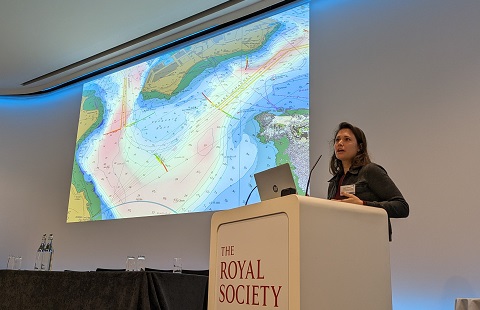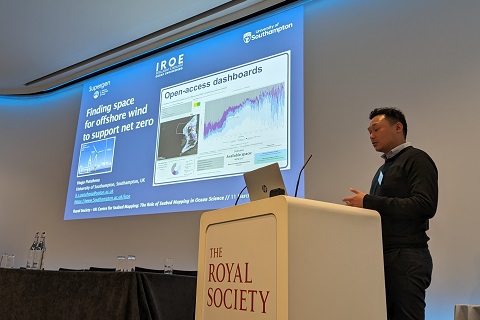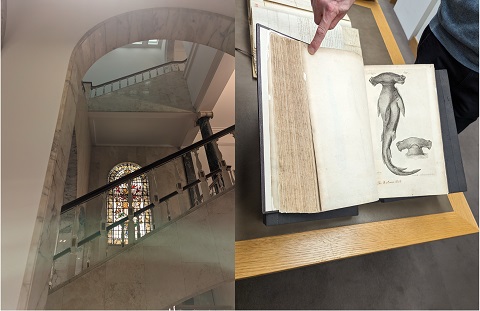SMMI Early Career Researchers present on ‘The Role of Seabed Mapping’ at the Royal Society

Two SMMI early career researchers were recently invited to present at an event on The Role of Seabed Mapping in Ocean Science.
Hosted by the Royal Society of London and the UK Centre for Seabed Mapping (UKCSM), the event aimed to address key policy challenges related to the ocean and contribute to the work and mission of the UN Ocean Decade. This took place at the Royal Society in London on the 11th of March 2024.
Dr Hugo Putuhena and Dr Giulia Champion were two among a handful of early career researchers and ocean professionals selected to give lighting talks on their research related to seabed mapping.
Hugo’s presentation focussed on his work developing a Geographic Information System (GIS) based software used to assess suitable space for future offshore wind around the UK. According to the tool, only approximately one-third of UK waters are deemed suitable for future offshore wind development, with nearly 90% situated in deep water, necessitating the use of new floating offshore wind technology. However, to meet the domestic electrification and hydrogen targets, only a fifth of the available space would be required.

Despite the considerable potential of the UK waters for future offshore wind projects identified by this software, it also highlighted several challenges that will require further research, development, and collaborations among stakeholders. Work needs to be done to assess and address the cumulative impact on the marine ecosystem, the challenge of deep waters and the offshore environment, and the increasing demand on the supply chain for foundations.
Download Hugo’s presentation slides to learn more about assessing suitable space for future offshore wind to meet net-zero targets by 2050.
Giulia, in her lightning address, spoke about her research with regarding ocean justice and the deep sea and the several ways in which it connects to seabed mapping. As a part of her work, Giulia considers how policy, science, finance, and culture mediate our relationship to the deep ocean and the seabed and how they create different narratives of this space. She is currently exploring these questions within the context of deep-sea mining for polymetallic nodules in the Clarion-Clipperton Zone. This is a vast area of the seabed outside of any country’s jurisdiction, between the Pacific Coast of Mexico and Hawaii.
Talking about the importance of seabed mapping and its role in deep-sea mining, Giulia shared some reflections with us from her presentation: “We have to bear in mind the critical colonial histories of mapping as this was itself a tool for conquest and expropriation for centuries. In the case of the ocean especially, mapping often flattened this complex three-dimensional space to a surface for trade and travel.”
“On the other hand,” Giulia continued, “modern advances in seabed mapping are challenging this ‘flattening’. Seabed mapping could allow us not only to undertake a topographical visualisation of the bottom of the ocean, but also to translate how complex, three-dimensional, and inhabited the seabed is. This understanding of the deep sea would create an opportunity for conversations to be opened with knowledge holders and coastal communities globally who have understood this complexity of the deep ocean for centuries.”

The event was attended by around 60 delegates including ocean and marine scientists, academics, and policymakers from across the UK Government. Dr Antony Firth, Head of Marine and Coastal Heritage at Historic England, gave the keynote address.
Overall, this was a great opportunity for networking, particularly for the early career researchers, and for exploring how current research can influence policy and progress in the seabed mapping community.
Hugo and Giulia are both involved in building and facilitating interdisciplinary networks at the University of Southampton through their roles as ‘champions’ of SMMI Special Interest Groups related to their research. Giulia serves in the group on Ocean Justice, and Hugo on Digital Oceans. These groups are open to anyone with an interest in research and work on the topic at hand, whether from within the University or beyond it. You can sign up to join these groups through the SMMI membership form.
Dr Hugo Putuhena is supported by the Royal Academy of Engineering Chair in Emerging Technologies Centre of Excellence for Intelligent and Resilient Ocean Engineering (IROE), the Supergen ORE Hub and the Southampton Marine and Maritime Institute (SMMI).
Dr Giulia Champion is a research fellow in English, under the University of Southampton Anniversary Fellowship scheme.